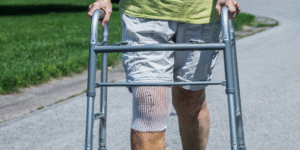The human knee is one of the most used and stressed joints in the body. Over time, due to aging, injuries, or conditions like osteoarthritis and rheumatoid arthritis, the cartilage in the knee wears down, leading to chronic pain, stiffness, and difficulty walking. When conservative treatments like medication, injections, and physiotherapy fail to relieve the symptoms, total knee replacement arthroplasty becomes a reliable and effective option to restore function and alleviate pain.

Total knee replacement arthroplasty involves replacing the damaged knee joint surfaces with artificial components to alleviate pain and restore function. This procedure has transformed the lives of many, enabling them to return to daily activities with improved mobility.
Dr. Sandeep Singh, a renowned orthopedic doctor in Bhubaneswar, shares, “Advancements in surgical techniques and prosthetic designs have significantly enhanced patient outcomes in knee replacement surgeries. Patients who undergo this procedure often reclaim their freedom of movement and confidence.”
Dr. Sandeep Singh is a renowned name in the field of orthopedic surgery. With years of experience and a patient-first approach, he specializes in advanced procedures like total knee arthroplasty in Bhubaneswar. Known for his precision, empathy, and excellent post-operative care, Dr. Singh ensures a smooth journey from diagnosis to recovery.
What are the common causes that lead to the need for knee replacement?

Various factors are responsible for knee joint degeneration, requiring replacement:
- Osteoarthritis:
This degenerative joint disease leads to the breakdown of cartilage, causing bones to rub against each other, resulting in pain and stiffness.
- Rheumatoid Arthritis:
An autoimmune condition where the immune system attacks the joint lining, leading to inflammation and joint damage.
- Post-Traumatic Arthritis:
Develops after a knee injury, such as fractures or ligament tears, leading to joint damage over time.
- Severe Knee Injuries:
Significant trauma can damage the cartilage and bone, leading to chronic pain and impaired function.
- Deformities:
Conditions like bow-leggedness or knock-knees can cause uneven stress on the knee joint, leading to wear and tear.
Identifying the root cause is crucial. Consult a specialist to determine the best course of action for your knee health.
What should I expect during the recovery process after total knee arthroplasty?

Recovery from total knee replacement arthroplasty involves several stages:
- Hospital Stay:
Patients typically remain in the hospital for 2-3 days after surgery. Pain control and physical therapy start during this period.
- Initial Recovery (Weeks 1-3):
Use of assistive devices like walkers or crutches is common. Physical therapy focuses on restoring movement and preventing complications.
- Intermediate Recovery (Weeks 4-6):
Adjustment to a cane and restoring mobility. Patients usually get back to light everyday activities.
- Long-Term Recovery (Months 3-6):
Most patients recover considerable strength and range of motion. Low-impact exercise such as swimming or bicycle exercise is encouraged.
- Full Recovery:
Obtaining maximum knee function may require one year, depending on general health and compliance with rehabilitation programs.
What activities or precautions should I follow post-surgery for long-term success?
To maximize the longevity of your knee replacement:
Do Low-Impact Exercises:
Walking, swimming, and cycling help maintain joint strength and flexibility.
- Refrain from High-Impact Athletics:
Avoid running, jumping, or making quick changes in direction to avoid excess stress on the joint.
- Be at Healthy Weight:
Being overweight can add extra stress on the knee joint, which may result in complications.
Use Assistive Devices:
When needed during the first recovery phase, the support of canes or walkers will be helpful in maintaining stability and preventing falls.
- Regular Check-Ups:
Scheduled appointments with your orthopedic specialist guarantee the implant is functioning properly and treat any issues promptly.
Conclusion
Total knee replacement arthroplasty presents a revolutionary solution for those suffering from chronic knee pain and mobility impairment. Once the causes, the process of recovery, and precautions are known, the patient can make an informed choice and obtain the best possible results.
With the skill of a specialist like Dr. Sandeep Singh in knee joint replacement in Bhubaneswar, patients are guaranteed to receive thorough care suited to their individual needs.
Ready to take the next step towards pain-free movement? Reach out to a specialist today to discuss your options.
Frequently Asked Questions:
How long does a knee replacement last?
Most knee replacements last 15 to 20 years, depending on activity levels and overall health.
When may I drive after surgery?
4-6 weeks post-surgery is the typical time period during which patients have gained enough strength and mobility to drive safely.
Are there complications with knee replacement?
Do I require physical therapy?
Can I kneel after a knee replacement?
Kneeling is possible but will be uncomfortable for some patients. It is best to talk to your surgeon.
How soon can I return to work?
Depending on the nature of your job, you may return to work within 6-12 weeks post-surgery.
Is there an age limit for knee replacement?
What materials are used in the implant?
Implants typically consist of metal alloys, ceramics, and durable plastic components.
Will I require a second knee replacement?
If both knees are involved, a second replacement may be required, either in one stage or two
How do I prepare my home for recovery?
Make your home trip-free, put grab bars up in bathrooms, and have assistive devices ready when needed.
Can I travel after surgery?
Once cleared by your doctor, traveling is feasible. However, it’s essential to take care during long trips to prevent problems.
Will there be a scar?
There is a surgical wound, but it will resolve with time following proper care.
How do I control pain after surgery?
Pain management consists of medications, ice treatment, and following prescribed exercises.
What is the success rate of knee replacements?
Total knee replacements have a high success rate, with most patients experiencing significant pain relief and improved function.
Reference Links:
https://www.ncbi.nlm.nih.gov/books/NBK499896/
Disclaimer: The information shared in this content is for educational purposes and not for promotional use.


